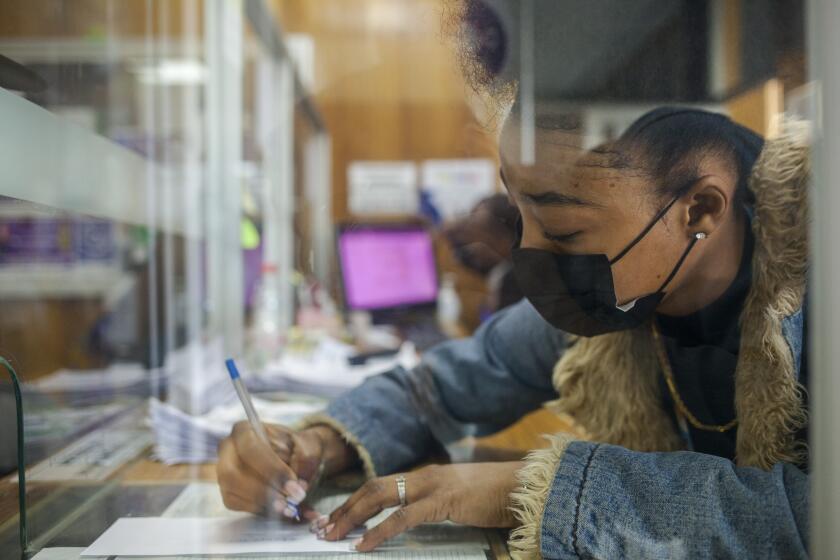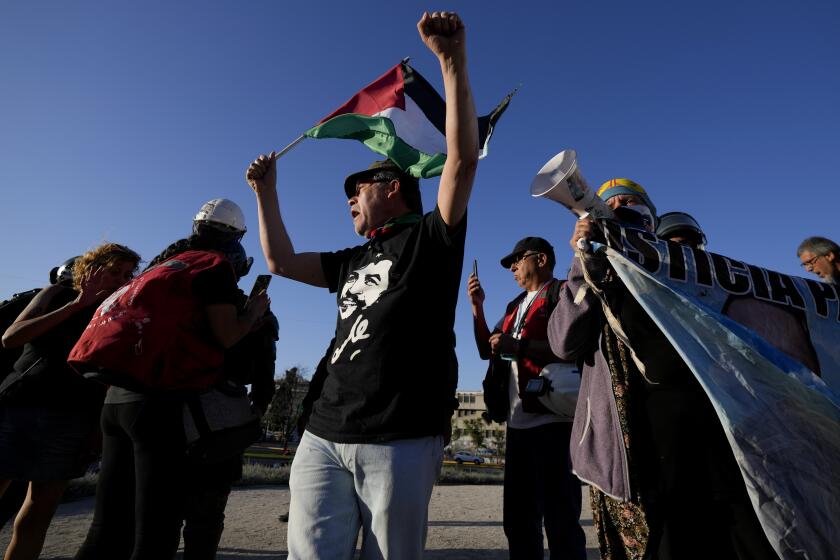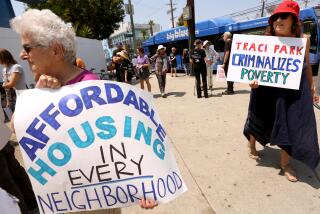Chile confronts a homelessness crisis, a first for one of South America’s richest countries

- Share via
SANTIAGO, Chile — The presidential residence of Gabriel Boric, the leftist millennial leader of Chile elected three years ago in the wake of public unrest over income inequality, shares a street in downtown Santiago with an overwhelmed homeless shelter.
The sight of cardboard boxes and blankets strewn across sidewalks in Boric’s bohemian neighborhood serves as a sharp reminder of his struggle to fulfill his promise to give Chileans “a better life.”
A pandemic-induced recession combined with a housing crunch and a major immigration influx have expanded Chile’s homeless population like never before. Over the last four years, the rate of homelessness in one of South America’s richest economies has jumped more than 30%, transforming the streets of a country that prides itself on its prosperity.
“The resources allocated to combat homelessness have been reduced, and the homeless population has increased,” said Rosario Carvajal, a city councilor in the capital, Santiago.
An encampment in the Juarez neighborhood of Mexico City shows how migration is impacting countries south of the U.S. border.
Even in the “barrios altos” — the well-heeled areas that presidents before Boric called home — destitute families have increasingly turned benches into beds and trees into toilets. In the beachside tourist hub of Viña del Mar, huddles of improvised tents have overshadowed the trendy art scene.
Chile said it has registered 21,126 homeless people this year, compared with 15,435 in 2020. Government figures rely on single-night snapshots by municipalities. Social workers put the real count around 40,000.
Last month, the government announced that, for the first time, it would include homeless people in its national census. Aid workers say that a better number, however flawed, will better reflect the scope of the problem and the country’s progress — or lack thereof — toward fixing it.
“This should force the government to implement more effective social policies,” said Andrés Millar of Chilean charity Hogar de Cristo.
The sheer visibility of so many homeless people in Chile — a country considered far wealthier and more stable than its neighbors — has pushed the problem up on the agenda. “There is a lot of pressure from the neighbors to recover the public spaces,” Carvajal said.
Many Haitians headed to the U.S.-Mexico border have lived for years in Chile. But life in the South American nation has not been easy for many.
Chilean police, reviled by the left for their harsh handling of the mass 2019 protests, have taken to tearing down encampments, joining municipal workers in routinely removing rough sleepers from parks and plazas.
“Police come and take everything, my tent, my blankets, my HIV medication,” said 43-year-old Paris López, who sleeps outside in downtown Santiago. She stays up all night, she said, fearing violence from police as much as assaults from criminal gangs that have recently gained a foothold in Chile.
“It’s dangerous,” Victoria Azevedo, a homeless mother of two, said of life on the streets in Santiago — particularly amid a crime wave that has driven Chile’s homicide rate up 50% since 2018. “If you are a woman and have children, it’s worse.”
In recent years, Chile has seen a demographic shift in its homeless population. Although there won’t be an official breakdown until the census comes out next year, experts say that the country’s affordable housing crunch has pushed more women and children onto the streets.
Chile votes against a conservative constitution to replace the country’s dictatorship-era charter, a little over a year after turning down a proposed leftist charter.
“Entire families have lost their resources to pay rent,” said Ximena Torres, another advocate from Hogar de Cristo.
COVID-19 pandemic lockdowns wreaked hardship on Chile’s economy while it was struggling to recover from the 2019 mass protests that cost the country at least $3 billion, Chile’s national insurance organization estimated.
Lavish pandemic aid — including a measure allowing Chileans to withdraw their pensions early — stoked inflation. The unemployment rate doubled to a record-breaking 13% from 2019 to 2020, making it difficult for many to pay rent. The central bank raised interest rates, lenders hiked the cost of loans and a housing crisis was born.
Housing prices have jumped 70% over the last decade, said economist Gonzalo Durán of the SOL Foundation, a Chilean think tank.
“I’m extremely broken inside,” said Moka Valdés, bursting into tears as she tried to describe the shock of having landed on the street last November after losing her job.
Along the 110 Freeway, a set of encampments built from repurposed housing materials epitomize the L.A. homelessness crisis
Many families bouncing between Chile’s tent camps are migrants in the country illegally, lured there by its reputation as South America’s most successful economy.
Government data show that nearly 1.6 million of Chile’s 19 million inhabitants are registered migrants, up from 1.3 million in 2018. The number of migrants there illegally also has soared, from 16,000 in 2020 to a staggering 53,875 two years later, according to the Observatory of Responsible Migration, a Chilean watchdog.
As the economy has slumped and public backlash against migrants intensified, Chile tightened visa requirements for Venezuelans — the largest group of recent arrivals. And last year Boric deployed armed forces to the northern border with Peru, a key migration pass, to check migrants’ documents and arrest smugglers.
After fleeing Venezuela and finding life as a migrant intolerable in Colombia and then Ecuador, 34-year-old Karen Salazar dreamed of Chile. Via foot and pickup truck, Salazar, her husband and their two small children braved freezing cold mountains, rough desert terrain and predatory smugglers, lured by Chile’s reputation as a rare upwardly mobile nation in the region.
They didn’t find what they hoped for. At first, they lived in a flimsy tent encampment in northern Chile. Then they moved to Santiago, where they slept outside in a public park.
The Settlers” (“Los colonos”), a revisionist western that questions the tropes of this quintessentially American genre and in turn shines a light on a hidden genocide, premieres in Los Angeles on Friday. It is Felipe Gálvez Haberle’s directorial debut.
“We know why we’re in this situation, but to see the children like this is heartbreaking,” Salazar said from the shelter on Boric’s street, where she queues for free meals.
As the crisis mounts, aid groups have intensified their pressure on the government. There are fewer than 200 homeless shelters nationwide, barely enough to accommodate 13% of Chile’s current homeless population, said local advocate Rodrigo Ibarra Montero.
Upon taking office in March 2022, Boric vowed to build 260,000 new government-sponsored houses during his four-year term. Given the scale of the problem, many fear that will not be enough.
But the president hopes it will.
“We are making steady progress,” he insisted in a recent speech inaugurating a new public housing development in Santiago. “You should judge us by the end of our term.”
Batschke writes for the Associated Press.
More to Read
Sign up for Essential California
The most important California stories and recommendations in your inbox every morning.
You may occasionally receive promotional content from the Los Angeles Times.















